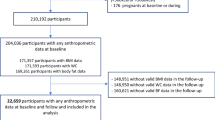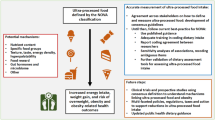Abstract
Several studies indicate that Western dietary and lifestyle factors are responsible for the high incidence of colorectal cancer in industrialized countries. Diets rich in red and processed meat, refined starches, sugar, and saturated and trans-fatty acids but poor in fruits, vegetables, fiber, omega-3 fatty acids and whole grains are closely associated with an increased risk of colorectal cancer. Other main features of the western lifestyle, such as excess body mass and sedentary behaviours, are also strongly associated with higher risk of developing this cancer. Modifications of the western diet, notably increasing consumption of foods from plant origin and reducing that of red meat intake, and maintenance of physical activity and appropriate body mass could substantially reduce colorectal cancer incidence and mortality.

Similar content being viewed by others
References
Parkin DM, Bray F, Ferlay J, Pisani P (2005) Global cancer statistics, 2002. CA Cancer J Clin 55:74–108
Goss KH, Groden J (2000) Biology of the adenomatous polyposis coli tumor suppressor. J Clin Oncol 18:1967–1979
Markowitz SD, Bertagnolli MM (2009) Molecular origins of cancer: molecular basis of colorectal cancer. N Engl J Med 361:2449–2460
Chan AT, Giovannucci EL (2010) Primary prevention of colorectal cancer. Gastroenterology 138:2029–2043
Huxley RR, Ansary-Moghaddam A, Clifton P, Czernichow S, Parr CL, Woodward M (2009) The impact of dietary and lifestyle risk factors on risk of colorectal cancer: a quantitative overview of the epidemiological evidence. Int J Cancer 125:171–180
Haenszel W, Kurihara M (1968) Studies of Japanese migrants. I. Mortality from cancer and other diseases among Japanese in the United States. J Natl Cancer Inst 40:43–68
Center MM, Jemal A, Ward E (2009) International trends in colorectal cancer incidence rates. Cancer Epidemiol Biomark Prev 18:1688–1694
Minami Y, Nishino Y, Tsubono Y, Tsuji I, Hisamichi S (2006) Increase of colon and rectal cancer incidence rates in Japan: trends in incidence rates in Miyagi Prefecture, 1959–1997. J Epidemiol 16:240–248
Yiu HY, Whittemore AS, Shibata A (2004) Increasing colorectal cancer incidence rates in Japan. Int J Cancer 109:777–781
World Cancer Research Fund/American Institute for Cancer Research (2007) Food, nutrition, physical activity, and the prevention of cancer: a global perspective. AICR, Washington DC
Burkitt DP (1969) Related disease—related cause? Lancet 2:1229–1231
Scharlau D, Borowicki A, Habermann N et al (2009) Mechanisms of primary cancer prevention by butyrate and other products formed during gut flora-mediated fermentation of dietary fibre. Mutat Res 682:39–53
Howe GR, Benito E, Castelleto R et al (1992) Dietary intake of fiber and decreased risk of cancers of the colon and rectum: evidence from the combined analysis of 13 case-control studies. J Natl Cancer Inst 84:1887–1896
Willett WC, Stampfer MJ, Colditz GA et al (1990) Relation of meat, fat, and fiber intake to the risk of colon cancer in a prospective study among women. N Engl J Med 323:1664–1672
Fuchs CS, Giovannucci EL, Colditz GA et al (1999) Dietary fiber and the risk of colorectal cancer and adenoma in women. N Engl J Med 340:169–176
Michels KB, Giovannucci EL, Joshipura KJ et al (2000) Prospective study of fruit and vegetable consumption and incidence of colon and rectal cancers. J Natl Cancer Inst 92:1740–1752
Koushik A, Hunter DJ, Spiegelman D et al (2007) Fruits, vegetables, and colon cancer risk in a pooled analysis of 14 cohort studies. J Natl Cancer Inst 99:1471–1483
Surh YJ (2003) Cancer chemoprevention with dietary phytochemicals. Nat Rev Cancer 3:768–780
Krebs-Smith SM, Kantor LS (2001) Choose a variety of fruits and vegetables daily: understanding the complexities. J Nutr 131:487S–501S
Johnston CS, Taylor CA, Hampl JS (2000) More Americans are eating «5 a day» but intakes of dark green and cruciferous vegetables remain low. J Nutr 130:3063–3067
Bingham SA, Day NE, Luben R et al (2003) Dietary fibre in food and protection against colorectal cancer in the European Prospective Investigation into Cancer and Nutrition (EPIC): an observational study. Lancet 361:1496–1501
van Duijnhoven FJ, Bueno-De-Mesquita HB, Ferrari P et al (2009) Fruit, vegetables, and colorectal cancer risk: the European Prospective Investigation into Cancer and Nutrition. Am J Clin Nutr 89:1441–1452
Michels KB, Giovannucci E, Chan AT, Singhania R, Fuchs CS, Willett WC (2006) Fruit and vegetable consumption and colorectal adenomas in the Nurses’ Health Study. Cancer Res 66:3942–3953
Witte JS, Longnecker MP, Bird CL, Lee ER, Frankl HD, Haile RW (1996) Relation of vegetable, fruit, and grain consumption to colorectal adenomatous polyps. Am J Epidemiol 144:1015–1025
Millen AE, Subar AF, Graubard BI et al (2007) Fruit and vegetable intake and prevalence of colorectal adenoma in a cancer screening trial. Am J Clin Nutr 86:1754–1764
Cruz-Correa M, Shoskes DA, Sanchez P et al (2006) Combination treatment with curcumin and quercetin of adenomas in familial adenomatous polyposis. Clin Gastroenterol Hepatol 4:1035–1038
Demeule M, Michaud-Levesque J, Annabi B et al (2002) Green tea catechins as novel antitumor and antiangiogenic compounds. Curr Med Chem Anticancer Agents 2:441–463
Yang G, Shu XO, Li H et al (2007) Prospective cohort study of green tea consumption and colorectal cancer risk in women. Cancer Epidemiol Biomark Prev 16:1219–1223
Powers HJ (2005) Interaction among folate, riboflavin, genotype, and cancer, with reference to colorectal and cervical cancer. J Nutr 135:2960S–2966S
Giovannucci E (2002) Epidemiologic studies of folate and colorectal neoplasia: a review. J Nutr 132:2350S–2355S
Cole BF, Baron JA, Sandler RS et al (2007) Folic acid for the prevention of colorectal adenomas: a randomized clinical trial. JAMA 297:2351–2359
Larsson SC, Orsini N, Wolk A (2010) Vitamin B6 and risk of colorectal cancer. A meta-analysis of prospective studies. JAMA 303:1077–1083
Chao A, Thun MJ, Connell CJ et al (2005) Meat consumption and risk of colorectal cancer. JAMA 293:172–182
Giovannucci E, Stampfer MJ, Colditz G et al (1992) Relationship of diet to risk of colorectal adenoma in men. J Natl Cancer Inst 84:91–98
Norat T, Bingham S, Ferrari P et al (2005) Meat, fish, and colorectal cancer risk: the European Prospective Investigation into cancer and nutrition. J Natl Cancer Inst 97:906–916
Goldbohm RA, van den Brandt PA, van ’t Veer P et al (1994) A prospective cohort study on the relation between meat consumption and the risk of colon cancer. Cancer Res 54:718–723
Sandhu MS, White IR, McPherson K (2001) Systematic review of the prospective cohort studies on meat consumption and colorectal cancer risk: a meta-analytical approach. Cancer Epidemiol Biomark Prev 10:439–446
Nelson RL, Davis FG, Sutter E et al (1994) Body iron stores and risk of colonic neoplasia. J Natl Cancer Inst 86:455–460
Sugimura T, Wakabayashi K, Nakagama H, Nagao M (2004) Heterocyclic amines: mutagens/carcinogens produced during cooking of meat and fish. Cancer Sci 95:290–299
Martinez ME, Jacobs ET, Ashbeck EL et al (2007) Meat intake, preparation methods, mutagens and colorectal adenoma recurrence. Carcinogenesis 28:2019–2027
Sinha R, Chow WH, Kulldorff M et al (1999) Well-done, grilled red meat increases the risk of colorectal adenomas. Cancer Res 59:4320–4324
Renehan AG, Tyson M, Egger M, Heller RF, Zwahlen M (2008) Body-mass index and incidence of cancer: a systematic review and meta-analysis of prospective observational studies. Lancet 371:569–578
Ning Y, Wang L, Giovannucci EL (2010) A quantitative analysis of body mass index and colorectal cancer: findings from 56 observational studies. Obes Rev 11:19–30
Moghaddam AA, Woodward M, Huxley R (2007) Obesity and risk of colorectal cancer: a meta-analysis of 31 studies with 70, 000 events. Cancer Epidemiol Biomark Prev 16:2533–2547
Chavez JA, Summers SA (2010) Lipid oversupply, selective insulin resistance, and lipotoxicity: molecular mechanisms. Biochim Biophys Acta 1801:252–265
Fasshauer M, Paschke R (2003) Regulation of adipocytokines and insulin resistance. Diabetologia 46:1594–1603
Calle EE, Kaaks R (2004) Overweight, obesity and cancer: epidemiological evidence and proposed mechanisms. Nat Rev Cancer 4:579–591
Nam SY, Kim BC, Han KS et al (2010) Abdominal visceral adipose tissue predicts risk of colorectal adenoma in both sexes. Clin Gastroenterol Hepatol 8:443–450
Coussens LM, Werb Z (2002) Inflammation and cancer. Nature 420:860–867
Balkwill F, Charles KA, Mantovani A (2005) Smoldering and polarized inflammation in the initiation and promotion of malignant disease. Cancer Cell 7:211–217
Gillen CD, Walmsley RS, Prior P, Andrews HA, Allan RN (1994) Ulcerative colitis and Crohn’s disease: a comparison of the colorectal cancer risk in extensive colitis. Gut 35:1590–1592
Chan AT, Ogino S, Fuchs CS (2007) Aspirin and the risk of colorectal cancer in relation to the expression of COX-2. N Engl J Med 356:2131–2142
Bertagnolli MM, Eagle CJ, Zauber AG et al (2006) Celecoxib for the prevention of sporadic colorectal adenomas. N Engl J Med 355:873–884
Rostom A, Dube C, Lewin G et al (2007) Nonsteroidal anti-inflammatory drugs and cyclooxygenase-2 inhibitors for primary prevention of colorectal cancer: a systematic review prepared for the US Preventive Services Task Force. Ann Intern Med 146:376–389
Giugliano D, Ceriello A, Esposito K (2006) The effects of diet on inflammation: emphasis on the metabolic syndrome. J Am Coll Cardiol 48:677–685
Calder PC (2002) Dietary modification of inflammation with lipids. Proc Nutr Soc 61:345–358
Larsson SC, Kumlin M, Ingelman-Sundberg M, Wolk A (2004) Dietary long-chain n-3 fatty acids for the prevention of cancer: a review of potential mechanisms. Am J Clin Nutr 79:935–945
Booth FW, Chakravarthy MV, Gordon SE, Spangenburg EE (2002) Waging war on physical inactivity: using modern molecular ammunition against an ancient enemy. J Appl Physiol 93:3–30
Colditz G, Cannuscio C, Frazier A (1997) Physical activity and reduced risk of colon cancer: implications for prevention. Cancer Causes Control 8:649–667
Wolin KY, Yan Y, Colditz GA et al (2009) Physical activity and colon cancer prevention: a meta-analysis. Br J Cancer 100:611–616
Regensteiner JG, Mayer EJ, Shetterly SM et al (1991) Relationship between habitual physical activity and insulin levels among nondiabetic men and women: San Luis Valley Diabetes Study. Diab Care 14:1066–1074
Handschin C, Spiegelman BM (2008) The role of exercise and PGC1alpha in inflammation and chronic disease. Nature 454:463–469
Cho E, Smith-Warner SA, Ritz J et al (2004) Alcohol intake and colorectal cancer: a pooled analysis of 8 cohort studies. Ann Intern Med 140:603–613
Ferrari P, Jenab M, Norat T et al (2007) Lifetime and baseline alcohol intake and risk of colon and rectal cancers in the European prospective investigation into cancer and nutrition (EPIC). Int J Cancer 121:2065–2072
Jacobson JS, Neugut AI, Murray T, Garbowski GC, Forde KA, Treat MR, Waye JD, Santos J, Ahsan H (1994) Cigarette smoking and other behavioral risk factors for recurrence of colorectal adenomatous polyps (New York City, NY, USA). Cancer Causes Control 5:215–220
Giovannucci E (2001) An updated review of the epidemiological evidence that cigarette smoking increases risk of colorectal cancer. Cancer Epidemiol Biomark Prev 10:725–731
Botteri E, Iodice S, Bagnardi V et al (2008) Smoking and colorectal cancer: a meta-analysis. JAMA 300:2765–2778
Burt RW, DiSario JA, Cannon-Albright L (1995) Genetics of colon cancer: impact of inheritance on colon cancer risk. Annu Rev Med 46:371–379
Le Marchand L, Zhao LP, Quiaoit F, Wilkens LR, Kolonel LN (1996) Family history of colorectal cancer in the multiethnic population of Hawaii. Am J Epidemiol 144:1122–1128
Le Marchand L, Wilkens LR, Hankin JH, Kolonel LN, Lyu LC (1999) Independent and joint effects of family history and lifestyle on colorectal cancer risk: implications for prevention. Cancer Epidemiol Biomark Prev 8:45–51
Platz EA, Willett WC, Colditz GA et al (2000) Proportion of colon cancer risk that might be preventable in a cohort of middle-aged US men. Cancer Causes Control 11:579–588
Acknowledgments
This study was funded by a grant from NSERC and by the Research Chair in Cancer Treatment and Prevention.
Author information
Authors and Affiliations
Corresponding author
Rights and permissions
About this article
Cite this article
Gingras, D., Béliveau, R. Colorectal Cancer Prevention Through Dietary and Lifestyle Modifications. Cancer Microenvironment 4, 133–139 (2011). https://doi.org/10.1007/s12307-010-0060-5
Received:
Accepted:
Published:
Issue Date:
DOI: https://doi.org/10.1007/s12307-010-0060-5




